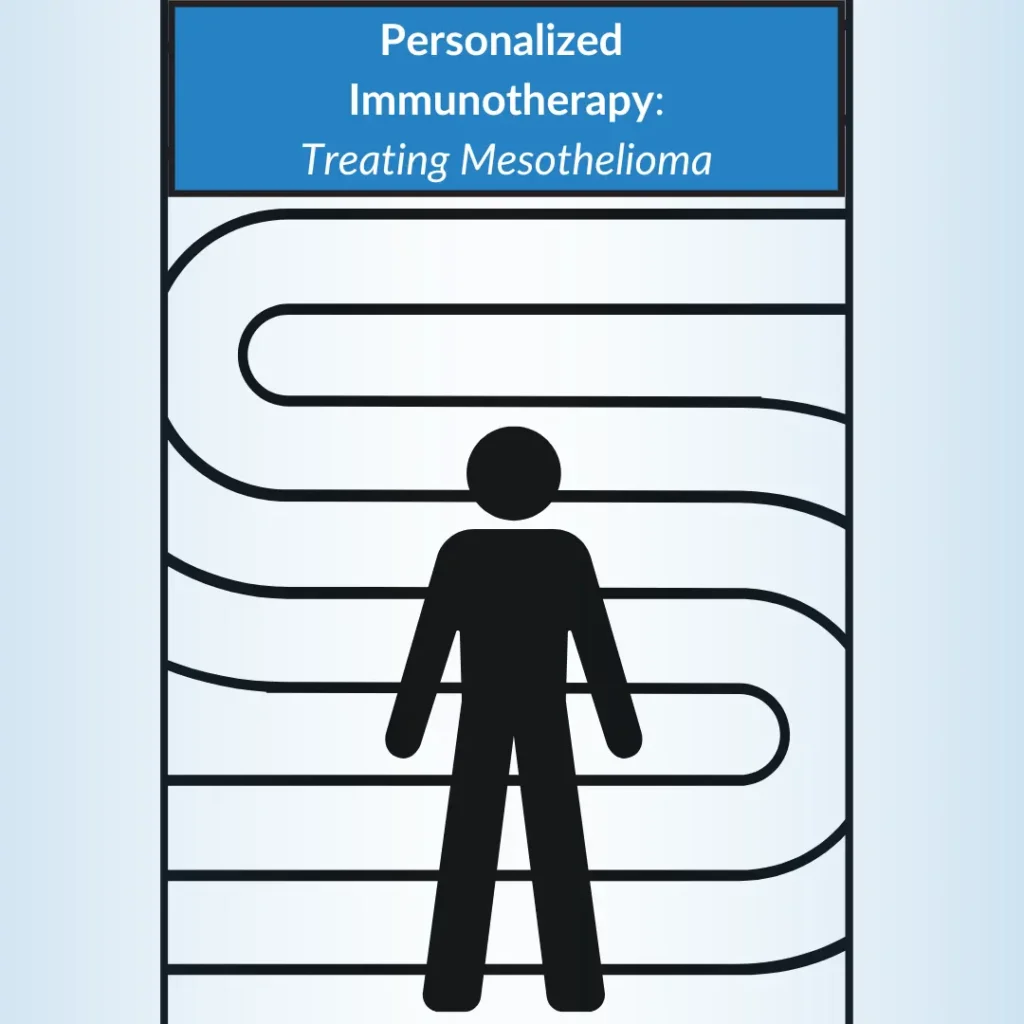Key takeaways: Treating mesothelioma through personalized immunotherapy uses the patient’s own immune cells—albeit genetically modified—to fight mesothelioma. In a clinical trial enrolling colorectal patients, three of the seven experienced shrinkage in their tumors. In the context of mesothelioma, personalized immunotherapy could change the ways in which we conceptualize the reach of treatment.

Personalized Immunotherapy vs. Traditional Immunotherapy
Traditional immunotherapy utilizes the body’s natural immunity in different, non-specific ways. This could look like increasing the number of certain antibodies, restoring anti tumor capacities to immune cells, or injecting lab-grown immune cells into a patient’s body. Immunotherapy has proven largely successful, especially in the context of mesothelioma treatment: it often results in tumor stability, which means no growth beyond the tumor’s original size. Additionally, immunotherapy has less side effects than other systemic forms of treatment, like chemotherapy.
A downside of immunotherapy is that it’s not always as successful as chemotherapy, despite recent strides in efficacy and safety. Chemotherapy works by intercepting all cells’ reproduction, so it affects all bodily cells—not just cancerous ones. Immunotherapy only targets cancerous cells, which seems effective in theory. In application, it doesn’t work as well as a systemic targeting of all bodily cells. This has been a challenging tradeoff for care providers, especially considering that chemotherapy is, on the whole, more effective than immunotherapy, although it produces more side effects.
A new study published by Nature Medicine looked at a clinical trial conducted in patients with colorectal cancer. Despite the niche group of participants, the researchers deemed the results as applicable to all patients with solid tumors, mesothelioma included. They found that an individualized approach to immunotherapy—a modified iteration of the original approach—proved largely successful.
In this context, individualized immunotherapy refers to the genetic engineering of lymphocytes found in patients. Lymphocytes are a class of immune cells that have many specialized iterations (T cells and B cells, mainly). On a macroscopic scale, lymphocytes are responsible for a.) detecting antigens; and b.) producing antibodies to target and kill said antigens. In mesothelioma patients, the functionality of these lymphocytes is often impaired or completely usurped, as characteristic of mesothelial immune environments. The reason that mesothelioma tumors are able to sustain themselves and grow is because they’re able to “turn off” lymphocyte function.
In this study, the lymphocytes were engineered to contain receptors for detecting colorectal cancer cells. This means that they were able to a.) correctly identify cancerous cells as being cancerous; and b.) could coordinate an immune response as a result. Instead of introducing external immune cells—so, cells that weren’t already circulating in a patient’s body—researchers were able to alter existing cells. By effect, this means there’s less of a chance for the body to reject the cells and there’s a greater chance that the immune cells will successfully reproduce with their genetic modifications.
In three of the seven patients enrolled in the trial, their tumors actually reduced in size. This is monumental: in other immunotherapy studies, the tumors remained stable, meaning they didn’t experience any growth or shrinkage. The findings from this study suggest that personalized immunotherapy could help reduce tumor size, which hasn’t been conceptualized as a treatment possibility for mesothelioma patients. With a long latency period, delayed diagnosis, and often grim prognosis, the shrinkage of mesothelioma tumors is a serious milestone in treatment capacities.
Implications for Future Treatment
Importantly, these studies will have to be conducted in the context of mesothelioma for them to be implemented. Mesothelioma could be managed like a chronic disease if treatments could shrink tumors. Additionally, if the lymphocytes are able to reproduce with their genetic alterations intact, there wouldn’t have to be multiple iterations of treatment for it to be successful. Personalized immunotherapy is revolutionizing the ways in which we think about and research new treatment strategies.
If you or a loved one has been diagnosed with mesothelioma or another asbestos-related disease, we are here to help. Our website offers useful information regarding types of asbestos-related diseases, hospitals to receive treatment in Pennsylvania, a variety of different treatment options, and more. For more information or for legal help, please call us at (800) 505-6000 or simply fill out our contact form.
Sources:
https://www.ncbi.nlm.nih.gov/books/NBK26921
https://www.cancer.gov/about-cancer/treatment/types/immunotherapy/side-effects
https://www.frontiersin.org/journals/immunology/articles/10.3389/fimmu.2023.1333661/full
